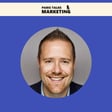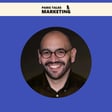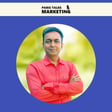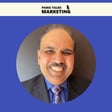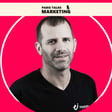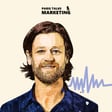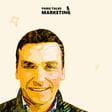Introduction and Guest Introduction
00:00:01
hoponline
Hi everyone. and Welcome back to another episode of Paris Talks Marketing. Today, my guest is Ben Catley Richardson. Ben is the Accountability Viking. He is the founder of Accountability Viking, helping lots and lots of cool, fast growing agencies to get shit done and have more fun. So Ben, welcome to the show.
00:00:21
Ben
Thank you so much for having me on Paris, it's brilliant to be here.
00:00:24
hoponline
Yeah. Tell us a bit more about who you are and what you do.
The Viking Persona and Self-Employment Journey
00:00:28
Ben
So, um I mean, let's start with the Viking in the room. I, yeah, as the accountability Viking, I've kind of taken on this persona, mainly in in a response to having been completely ignored through most of my self-employment before this point. so You know, when we talk marketing, as I'm sure you'd understand and anybody listening understand cut through attention as is it Chris Doe calls it the attention economy or, you know, he references that the idea about getting eyeballs is half the battle. And so I have been self-employed doing ghostwriting, marketing strap strategy, planning. I was part of a branding agency for a couple of years as well. And I've been doing that for about eight years.
00:01:14
Ben
And all through that time, I was just always coming up against that niching problem, that standout problem, that issue of nobody gives a crap, excuse my language, nobody gives a crap about you. They want to be you know told that they can get what they want very quickly, or they want to just have a smile on the face. They want something to entertain and and improve their lives.
Coaching and Finding a Niche
00:01:36
Ben
And so all the way through, I was trying different niches, trying different ideas, And I did a um ah marketing course with a guy called Louis Grenier a few years ago. Now, excuse the language. This is the name of his course. It's called Stand the Fuck Out.
00:01:53
Ben
And Louis is just completely sums it all up. He's really going out of his way to get that stand out for his own brand and business, but also to then help people do the same. I went into that course knowing Louis a little bit, having lots of ideas about what I wanted to do. And I came out of it with an idea, but it never really went anywhere. It was about charities and I wanted to help them build communities. Now, about six to eight months later, I'd been doing coaching for small businesses for their marketing. I hadn't really called it coaching, but we'd basically done the coaching cadence, if you like, which is we jumped on a call every week. I spoke to them for 30 to 60 minutes about what they were trying to achieve. And then I helped them to craft what were we were going to do in the marketing that week. And I wrote most of it as well.
00:02:42
Ben
And after about eight months, six months, as I say about that, after doing the course, Louis approached me because I'd had such a good time on the course and he asked me to be an accountability coach for his next cohort. So that was a great opportunity. And it obviously lit in me this idea of, hey, I can take what I'm doing right now and apply it to essentially this sort of more niche term of accountability. And I wonder whether that, will take me where I want to be. And so I did the guest coaching, had an absolute whale over time, built some really good friendships and got some really good results for people.
00:03:19
Ben
And then I just went out and started doing some market research and finding that everybody from solo entrepreneurs to people who were growing agencies or small businesses or even corporations were talking about accountability.
00:03:33
Ben
So I was kind of dead set on that. Then me and Louis talked at the beginning of last year and he was like, okay, fine. But what when are you gonna do something with the Viking? Now the background of the Viking is that many years ago I used to do um poetry recitals. So I do stand up poetry and open mic nights, stuff like that. I was basically had it in my sights to be a performance poet.
00:03:57
Ben
And my style of poetry is quite unusual. It's acapella, it's sung, it's almost chanted in times and it's very kind of epic storytelling. I called it melodic storytelling for a while and just nobody ever got it. Nobody ever got it. And then I started to take on the shape of what you know I've got now, but on the stage for the poetry.
00:04:19
Ben
And as soon as I stood up with my hair like this, with the tattoo, not with the armor at that time, but basically with that kind of image, people were like, oh yeah, that makes sense that he would do this poetry.
Authenticity and Embracing Persona
00:04:31
Ben
And so I really saw that congruence between image and delivery that you know made sense with the poetry.
00:04:37
Ben
But yeah, Louis was like, beginning last year, why have you never done anything with that? That's you, it's part of you. And so I played around with it. And I'll be honest with you, I was unsure to begin with, because I don't wanna get into a position where genuine you know Norwegian people are there saying I'm culturally appropriating stuff that's beyond my kind of understanding or anything like that. So I reached out to a couple of people and I had a chat and basically the feedback was, don't be stupid. You know, just do it because people love something that gives them a smile and you've got a reason for it.
00:05:10
Ben
You've got kind of a grounding in it. And as long as you can always live up to it, then that's all that matters. So yeah, so I just, we just went for it and to kind of tie it all the way back to why accountability Viking.
00:05:22
Ben
For me, accountability is taught to us in only one way. And that's almost the stick, right? You are responsible for this. You should have done that. It's your fault that this didn't happen. That's how we see accountability. So it's a very negative vibe in many ways. And what we see in lots of people who are trying to build their own businesses is that they beat themselves up. And that's as much accountability as they almost can manage. That's how they've been taught. It's how we've all been taught to work. But when you actually look at accountability, and later on I'll talk to you about the sort of science behind it that I've been introduced to as well, but ultimately for me it's two sides. There is an expectation. You've got to live up to something. Live up to a promise or live up to an expectation. But the other side of it is inspiration. You've got to stand for something. You've got to be for something. You've got to be trying to achieve something.
00:06:20
Ben
And it's the joining of those two parts that really makes accountability special for me. And so the Viking in many ways is me having a way to inspire myself to keep getting excited, to excite other people and to do something that I love, which is just this crazy, you know, having fun doing a business. So it's something I can stand for. I believe we should be in business to enjoy ourselves, to have fun, to have that lifestyle. but then it's also something I have to live up to. You cannot, and I go to networking events dressed like this, you cannot walk in,
00:06:51
hoponline
So Ben, is is it fair to say that that that yourre your commitment to being the accountability Viking is also your own way to keep yourself accountable?
00:07:01
Ben
That's it. Yeah. I know um you'll have to stop me if I get very passionate because, you know, this is really driving me, but that's exactly it. I'm holding myself to account and you can't walk in looking like this to an event and be like, Oh yeah, I know. It's just a, it's just a silly thing. it's I'm just doing it for attention.
00:07:16
hoponline
Now, you've got to be all in. Yeah, there's no halfway home with being viking.
00:07:19
Ben
Exactly. There's no halfway. That's it. And that's really then the Viking. I help other people apply that thinking, which is.
Procrastination and Its Roots
00:07:28
Ben
Yeah, you've you've got to go full in. If you want to learn something, if you want to grow something, if you want to develop, if you want to get somewhere, you've got to go all in. And so the Viking is a fantastic character to use for that.
00:07:40
hoponline
that's That's awesome. um So let's let's pivot to, I think, a related topic. And this this might be the but the evil stepsister of accountability, which is procrastination, and something we talked in the pre-show about.
00:07:56
hoponline
And this is me personally something that I've struggled with know practically my whole career is procrastination and I believe a lot of other marketing folks do that as well because there is and in a lot of cases.
00:08:13
hoponline
um There's so many things to do and and you have to prioritize, um but it's always so tempting to to just do the easiest thing first and and grab the lowest hanging fruit. But I think we all do procrastinate on the bigger, more important things. How do you help your your clients who are struggling with procrastination?
00:08:35
Ben
That's a great question because I mean essentially that's where a lot of people come to me is in that stuck mode that procrastination mode or as some people call it shiny object syndrome and ultimately we are again we're taught to believe that these things are problems we're taught to believe that they're outside of us
00:08:56
Ben
And the pressure that we get is just to get over ourselves, get through this stuff. You know, it's like any kind of emotion. There's a lot of tied up kind of societal pressure to just get over yourself.
00:09:08
Ben
None of that really appreciates the fact that procrastination, distraction, overwhelm, all of these problems, they are safety behaviors. they are as subconscious our brain rebelling against what we are trying to do or what is being expected of us because we're in a threat state with threatened by something and usually it's uncertainty the unknown or you know a lack of clarity in what somebody is actually asking us to do and what will happen if we do that.
00:09:42
Ben
So standing out is a great example. So obviously, I'm quite you know there with standing out. I'm getting there. I'm enjoying the biking thing. But if you do that, you very quickly start to divide people immediately. Now, that's a great method of doing marketing. You want to pre-qualify as early as possible. But what it means is that, for instance, you can walk through a town like I was not so long ago and you will walk past one group of quite drunk men and one of them will look up at you and say, shite haircut. And you're like, okay. And then you can walk down the road and another group of people can say, oh God, I love your haircut.
00:10:22
Ben
And so the reason that so few people stand out or do anything like make these decisions, make these commitments is because as soon as you move, you make the world react. As soon as you take a decision or a commitment, you're forcing everything around you to adapt to that. And largely you never know what's gonna happen. So what I start people with is on a sort of bespoke process of looking at why is this safety behavior arising, where is it coming from? What part of the action is it actually being you know created by?
00:10:56
Ben
But it's all underpinned by a system that and my favorite neuroscientist, Dr.
00:11:02
Ben
John B. Mollador, who runs the runs an institution in the States, he calls it the five gates of growth or the five gates of learning. And it's based on neuroscience research you know across the board, but he's kind of explained this to me and taken me through it. And when he introduced it to me, I was like, oh, fantastic. you know This is a model that you can use For anybody, you just have to adapt it to each person's process, each person's position. So I'll go into the gates in a little bit, but to answer your question, what we would do with procrastination is look at where is it coming from?
00:11:40
Ben
Is it when you sit down to start your day? Is it when you try and market your own services? Is it when you try and get onto a sales call? You know, what stage of the process is it? Because then if you can unpack those stages, you can start to do things like ask, well, what's the worst thing that could happen here? And often we feel that, but until we explicitly get it out of our heads and write it down, we can't control it or get over it. And so basically the biggest thing when you're looking at why do I procrastinate?
00:12:13
Ben
Why do I put things off? Is realizing that it's not a bad thing necessarily. It's not a thing to be, you know, battled or fought. It's something to recognize as a signal. It's telling you something just like any emotion, just like any instinct.
Addressing Procrastination Effectively
00:12:30
Ben
you something and you have to then have the tools to understand what it's telling you and then to do something about it.
00:12:36
hoponline
Yeah, that's a great explanation. And I couldn't resist the putting asking chat GPT before our call, why do people procrastinate? And it touched on a lot of the things that you just mentioned. But they're i mean the number four on the list of seven is poor time management. And that's what we would all assume. but some of these others really reinforce what you've just said and they're really interesting. Number one is fear of failure and then perfectionism, lack of motivation, poor time management, a feeling of overwhelm.
00:13:10
hoponline
um Instant gratification is interesting so always just seeking for the more immediate pleasure, pleasurable
00:13:18
hoponline
experiences, and then a lack of confidence. And I do entirely agree with you that before trying to solve for procrastination, it's really important to understand the the real source of it. And what what is the underlying emotion that's leading into to procrastination?
00:13:35
Ben
Yeah. A great way to do that, that doesn't create a lot of resistance.
00:13:41
Ben
So when we use words like why, why can't I do this? Why is a commanding word? And it closes down thinking, it forces you to try and come up with a neat reason that explains everything. And that's not going to help. So one of the things I do with it is
00:13:57
hoponline
And it's it's kind of an accusatory word, isn't it? Why? As a child, when when you're asked, why did you do that? It's usually you're being accused of something and you're in a defensive mode.
00:14:07
Ben
Yeah. Exactly. So it immediately puts you into that defensive mode. And we know that if you look up and David Rock, he's a really interesting guy. He's written a book called Your Brain at Work. But he also did a Google Tech Talk. And in that Google Tech Talk, one of the things, it's a great introduction to him and to neuroscience as a whole, really. One of the things he talks about is when you're in that threat state, when you're in a kind of decision, ah, you know, scary moment, your cognitive abilities shrink ridiculously. So yeah, if we ask ourselves, why can't I do this? We are never going to come up with the answer. So a way of doing a much better approach is to create curiosity. And I do that with people by saying, stop asking yourself, why can't I do this? And stop and look at what's happening and say, isn't it interesting that I can't do this?
00:14:57
Ben
And what that immediately does is open up thinking and allows you to put two and two together or four and four together or whatever. It just gives you what is essentially the first step actually on this gate system that I was talking about. The first gate is called awareness. This is the wording that Dr. John uses. And um awareness is just that ability to look up from the you know the immediate day to day and have an awareness, have an understanding of of what's going on. It's realisation of the problem, of the goal, of you know what should happen now. and so
00:15:33
Ben
Asking yourself questions that enable you to do that will always get you started into this gate system much more effectively. Whereas why is just, yeah, you're closing down so you can't have that
Systemizing Agency Processes
00:15:44
hoponline
yeah Absolutely. um let's Let's shift gears to, I think, something that a lot of ah agencies are are struggling with, and that is trying to create the systems. and And by the way, when I refer to agencies, I can also that can also be substituted with marketing teams as well. which is to create systems, repeatable systems in the business so that you don't have to treat every new project as a bespoke or a custom approach. You're not reinventing the wheel every time. um And we have, I believe, i'm I'm pretty proud to say, I think we have a lot of great systems here in our agency.
00:16:26
hoponline
But from time to time, I still see people um doing things in ah in an overly customized way where I think, maybe we need to revisit that system or maybe this is ah this is a sign that we don't have a system for this part of um the process. how do you How do you talk to your clients about um systemization and and ah productization of their services?
00:16:50
Ben
Well, let's talk first kind of practically the nuts and bolts of sort of agency life or, you know like you say, marketing team life. And then what I'll do is lead through to this the science that I keep kind of teasing and we'll come back to it because it all fits together.
00:17:03
Ben
So I'm working with a guy at the moment um who has an agency that he's trying to grow out. It's a web design agency. And he's hired and fired three people over the last four years because they just didn't fit. They came in. He couldn't get them to work with him, and he didn't get the same out of them that he gets out of himself. And the reason that connects to processes and systems, like you've just said, is that often, I loved what you said, overly customized, highly customized. What he's doing with his clients is customization on every step, like you say.
00:17:39
Ben
So he has an idea about, yeah, we deliver this website, but then it's, oh, you want it this style, or you want it this format, or you want it this web flow, or you you know, he's got lots of moments where he's adapting all the way along.
00:17:52
hoponline
And I guess just to interrupt them, sorry, but I think customization is tempting because the you feel that the client wants customization. If you tell clients that you're going to be so special that we're going to we're going to put our put our playbook to the side because for you, and you're so unique that we're going to do something very, very highly customized. That's what the client wants to hear. And I think it's tempting to to then carry that out. But please, please go ahead.
00:18:22
Ben
Yeah, i mean I think that's exactly it. right is ben is This is Ben, my client. he's He's in that situation where he's going, not only is that what the client expects, well, that's what I believe the client expects. Cause sometimes that's the problem as well, right? You know, you just put expectations on the client. But the other side of it is that's what he expects of himself.
00:18:40
Ben
He gives himself an incredibly high standard. He wants to give incredibly high value. And again, and this is a theme of mine and you know, people might get tired of it, but it's true. We have been shaped into a certain way by the world we've grown up in, mostly the Western world. It's taught us to be of use. to essentially be the tool, right? And so what we're always trying to be is be the best tool, to be the most useful part of ourselves. And so we're always, when we look at processes and systems, we're always moving away from them a bit, like you say, because we're like, well, but I want this to be really special for this person. I want them to feel like I've done them something really special. And actually, and this is the thing me and Ben were starting to wrestle with, there's also a sneaking suspicion that, hmm,
00:19:30
Ben
If I systemize this delivery of this product, or even if I productize this service, if I make it repeatable, I'm withdrawing value, I'm letting my customers down, because it's not going to be that you know bespoke kind of service. And at the same time, I think also, and Ben definitely had this to begin with, there's this sense of also I'll be ripping them off. I'll have to charge less. I'll have to charge less because it will take me less time, effort, energy, concentration, because I've already done it.
Time Management and Systemization Benefits
00:20:05
Ben
And I just listened to a Christo podcast with a guy called Tim Williams. He's a pricing expert for agencies.
00:20:12
Ben
And what he was talking about was, first of all, the history of the billable hour, which is like an Ogilvy invention, essentially, which is, you know, so you had different departments of an agency, you could break it down by hour, and then the clients saw a breakdown of that. And he's like, you can't continue that. First of all, agencies invented it, clients didn't ask for it. And secondly, you cannot tell me that if someone could solve your problem in one afternoon,
00:20:37
Ben
regardless of the time it took them to do it, but if they could solve your problem in one afternoon, or if it took, excuse me, or if it took six months to solve it, you would pay twice as much for that one afternoon solution, because just getting it done and getting your problem solved is the most important thing. And so that's when, with Ben and with a lot of people, I'm circling back to the kind of bible of systemization, which is the E-Myth, the book which just goes through that whole process of you can take, yeah, you can take people that are straight out of high school and put them into a business model that creates incredibly valuable employees.
00:21:06
hoponline
Yeah, that's that's a classic.
00:21:18
Ben
And so if we're looking at processes like I'm doing with Ben, the first thing that you're doing is saying, what can you repeat that worked before? What do people love that worked before? What can you bring into it? If you have a job that might have taken you four hours, can you get it down to two hours? And you know we talked to then, you were saying chat GPT suggesting time management. I think time management is a red herring so many times. It's not about time management. It's just about how well you use your time.
00:21:49
Ben
It's about what value you get out of your time. And ultimately, like Tim Williams is saying, it's moving to this idea of you're not selling yourself for hourly rates or hourly time to people. You're selling an outcome. You're selling a product.
00:22:05
Ben
And that's why systems and processes become so important because you can not only make more money because it's more profitable, but actually the more important thing is that it's more certain. It's more certain for you because you know exactly what's expected of you and what it takes and how long it takes. But the customer also knows exactly what they're going to get. And that is a highly valuable service to move towards. So the idea of not systemizing, which is grounded in this fear of you know letting people down or pride in quality or because people want it,
00:22:42
Ben
getting over that, understanding where that comes from and then looking at the fact that actually you can give even more value, you can actually give a better service if you systemize it is you know a really important mindset shift.
00:22:55
hoponline
Yeah, absolutely. And one of the most important systems in an agency, and I certainly believe this is the onboarding process, the um the system for onboarding a new client. And that's something that the the new clients will always remember. That's that's really a lasting first impression It sets the tone for the for the whole project. And oftentimes, a great onboarding process can, um in a lot of ways, it can it can guarantee you a long-term client or a bad onboarding process can really kind of spoil spoil things and and increase the likelihood of ah of a churn. how do you How do you think about onboarding and how do you help clients who don't have onboarding processes to create one? And what does a good onboarding process look like?
00:23:45
Ben
I think if you boil it down, a good onboarding process does two things. First of all, it recognizes the fact that this is the beginning of something, not the end. So especially when you've been a specialist, to use the myth kind of terminology, the technician, the specialist, especially when you've been in that role and then you started your own thing.
00:24:05
Ben
So you were in an agency or a business. and now you've come out and started your own thing. You're doing the sales, you're doing the marketing, you're doing the promotion. It can be tempting to feel like when you get somebody over the line, that's the end of it. Oh yes, we've done it. But you have to realize that that's the beginning of it for them. It's not the end. They've only just started. And so the first thing that onboarding should do is much like you said, it's about getting people into your system with a feeling of
00:24:39
Ben
not like, oh, I've just given my money and now they've abandoned me, or now I've signed the money away.
Onboarding and Client Relationships
00:24:44
Ben
They don't want to talk to me, or they're not as valuable. You've got to make them feel even more valuable than they did in the sales call. You've got to make them feel like, wow, I didn't expect this. Wow. This is a luxury service. Wow. This is, you've got to impress them. So on the first part, the onboarding system has to impress them and raise their opinion of you even beyond where it was already.
00:25:05
hoponline
Yeah, I think that that part of it is about overcoming the buyer's remorse, which is inevitable.
00:25:13
hoponline
And I think we all we all feel that. And with any sort of purchase really that once, once you buy it and you've made that commitment, and and it's done, and and the money has changed hands or you've signed, ah you've signed on the dotted line, your immediate reaction is, God, did I make the right choice.
00:25:31
hoponline
Could we have waited, or can we have hired someone else. And that they're just instinctually that that remorse and a little bit of regret. And what we try to do in our onboarding process is recognize that on the kickoff call, that probably one of the underlying emotions of that new client is some sort of remorse, and we need to prove to them, and no, you you really did make the right choice here.
00:25:57
hoponline
Take that little bit of remorse you might be feeling and just bury it.
00:26:00
Ben
And ultimately, you need to not leave a gap at all for that remorse to happen.
00:26:01
hoponline
Because we're going to be...
00:26:06
Ben
So when I bring on a client, I immediately send an onboarding pack.
00:26:10
Ben
So they give the AOK, even before they've paid the invoice, I send them an onboarding pack. And it's got two PDFs with imagery on my brand and a reminder of what we're doing and an introduction to the thing.
00:26:23
Ben
It's basically you're trying to create excitement.
00:26:26
Ben
You've done something, you've decided you've started something, right? Rather than, right, now we've done the business part. Now we have to, if you hate the delivery, they're going to know that. Now, if you're all about just the money, they're going to feel that.
00:26:38
Ben
A good example I love is, have you seen the remarkable tablets? You know, those digital, talk so I've got one here.
00:26:43
hoponline
No. Oh, actually, I have one of those. I'm sorry.
00:26:47
hoponline
I have the first generation. Yeah.
00:26:49
Ben
Well, I don't know what the first generation was like, but the second generation one that I got essentially had an onboarding package built in. So unboxing obviously is a huge thing and has been for many years. But when I got this package, what I thought was brilliant about it was that every part of the box and the packing and everything was papery.
00:27:10
Ben
And so as you opened it, you were like, yeah, you you spent a lot of money and it was a lot of money. Have I made the right decision? You take it out of the delivery box and everything is pay-free. Everything is priming you to have that good experience with a tablet.
00:27:24
Ben
And let's be honest, the tablet has its problems. It's got its bugs and errors and issues. But when I started using it, I'd been primed. I'd been onboarded. to see it like this really luxury, papery kind of replacement to notebooks. And that's essentially what the best onboarding does is prime people to have the best experience with you.
00:27:48
Ben
The other side of onboarding, which is probably just as important, if not more, is expectation management.
00:27:55
Ben
I find, and I'm working with a guy actually who's gonna turn over probably 350K British pounds this year for his agency, and he has no onboarding process. And so what problems does he run into? People forget the schedule that they'd agreed. People forget to provide logins or assets that they'd agreed to. People forget that they agreed to write a blog. People forget that you know there was gonna be a standstill moment while they did some research. He gets emails within two weeks saying, when are you going to start work?
00:28:26
Ben
Are you doing anything? Now, the best onboarding then also manages this expectation.
00:28:30
hoponline
Oh boy, if you ever get that question, you you know, you've you've you've messed up the onboarding if they're asking, have you started yet?
00:28:34
Ben
Yeah. and Exactly. And a part of the problem, as he puts it, is they just don't understand that SEO takes time, research takes time, an audit of the website takes time, and it's not visible. So I was like, well, make it visible. That's what your onboarding should do. It's an introduction. It's a reminder of what was agreed. It's a, this is what we're going to do next. It's a, this is what you need to get. This is your schedule. And then I said, and throw in at the end, A little guide to SEO, a guide to the involvement that it takes for research, a guide to the schedule and the timeframes that it works in terms of results, and tell them when they're going to get their first results. Now, for me, all of this goes back to my experiences in communications departments and stakeholder management. People think that not saying anything is safest.
00:29:27
Ben
but all you do is create room for people to suspect, for people to create. That's where conspiracy theories come from, right? Because there's a gap. The best thing is always, even if you've got nothing to say, the best thing is to say, I've got nothing to say, or I don't know, or you know I can't give you anything right now, I'll update you soon.
00:29:47
Ben
Of course, if you're actually onboarding a client, you should never feel like that because you should know exactly what's gonna happen. So if you can manage their expectations at that stage, it's gonna make it easier for you. And if you can create this exciting experience so they feel like they're beginning a journey rather than like you say, start to get buyer's remorse, that's what an onboarding process should look like.
00:30:10
Ben
And just to finish, the best thing about all of that is that if you've got an agency, you probably almost don't need to be involved. And this is where systems come into it. you If you're struggling with delegation, it's likely because you have no repeatable system. You don't know how to repeat the results that you get all the time.
00:30:28
Ben
It's just in your head. But if you have systems, if you had your onboarding system all done, you can have a junior member of staff just run through templates. It doesn't need to be somebody with huge specialist skills. So that means that it's more affordable to bring them in. It means that you're freeing up labor, time, time hungry kind of moments. And then you can focus on valuable moments, which is actually obviously delivering on the promise you've made.
00:30:54
hoponline
Absolutely. That's great. um The last topic that ah that I want to cover today is about staffing. And a lot of the agencies that you work with are in a fairly early stage, but they're ramping up and they're they're needing to hire people. And we're also in this very yeah interesting and and disruptive age of AI. We're at the beginning of it, where AI's promise is that marketing teams can do a lot more with fewer people And so you've got that pushing pushing against you on one side.
Hiring and Workload Management
00:31:27
hoponline
ah You may have the the existing team saying, hey, we really need, our workload is now up to here and we really do need to to bring on new people. By the way, what I'm describing to you is what what I'm going through on a regular basis.
00:31:42
hoponline
And what I'm trying to do as an agency ah founder and and owner operator is to establish a more systematized way of knowing when we need to bring on that next hire. Can we wait? There's of course always that push and pull of, hey, well, if we can squeeze the team a little bit more and get them get the productivity level a little bit higher, that's going to go straight to our margins. um But then if we if we push them, if the workload is is too intense for too long, maybe we're going to lose people.
00:32:18
hoponline
and Or maybe the quality of the work is going to suffer or both, which could lead to client churn and other problems. And it's a fine line. It's a it's a balancing act. I'm sure you've heard this from clients before when when they ask you, well, how do I know it's time to hire the next person? How do you help them to understand that staff and kids?
00:32:37
Ben
So it's really interesting because the as I said, Ben, who am I'm helping to systemize his business, one of the first things he said was about this, I've hired people and I've had to fire them because they didn't work. So one of the first things we did was go, okay, have you actually, do you know what you're trying to achieve in your business? Okay, do you know what the blocker is? Do you know why you haven't got that right now? Okay, you don't quite know, right, let's unpack that. When you start to unpack that, you then get towards one of the most important things for any business, for growing anything, but certainly for an agency where things are changing all the time is a priority. Now we talk about priorities and and we use that word often for tasks or actions. You've got to stop that, right? Never have priorities.
00:33:22
Ben
The word priorities only kind of came around 100 years ago or so, coincidentally, the Industrial Revolution when people were trying to be squeezed and you had competing demands. and But ultimately, the word means the thing before all other things, the one thing before all other things. So there cannot be priorities. So if you can look at what's missing, what's stopping you getting where you want to be, you can then start to craft. And it is an iterative process. You have to try these things and experiment, but you can craft a priority. And if you have a priority, then you can start to, as I tell people, put your tasks through trial by combat, which is where you say, okay, does this actually service this priority? Does this contribute? How much does it contribute? And if it contributes highly, I should be doing more of that. I should put more of my energy into that. So if you get to this stage and you have a priority for your business,
00:34:16
Ben
Then you can start to say, okay, what am I missing? That means I can't service this priority. Oh, it's because I'm spending as Ben was doing and other people that I've worked with were doing, I'm spending half my week just sending invoices, chasing payments, doing accounts, looking at my expenses, updating spreadsheets, you know, time hungry tasks, low value without being too judgmental, low outcome value tasks. So then you can start to say, okay, can I gather enough of those together to actually make a role? Or do I need a bookkeeper or a virtual assistant? So the first stage is never going, okay, right, who do I hire? i need Because I've got loads of work on, I need another me. I need another web designer. I need another copywriter. Bring them in. The first stage is always, where's the gap in the business? Where's the thing that's draining us from our ability to move forward as a business?
00:35:11
Ben
And what shape does the solution look like for that? So I've actually just put together a quiz and an accompanying eBook, which is all about avoiding the five mistakes that digital agencies make when they make their first full-time hire. So um I'll provide you with the link um you know that can come with the show. But essentially what that will do is take you through everything that through my conversations with leading and established agencies and my own clients, What do you actually need to have in place before you bring on a full-time person or maybe another full-time person?
00:35:44
Ben
What exercises can you go through? And then the eBook takes you through the exercises that you can actually do to do that. What I want to do if it's okay is move from that, which is the sort of, again, the nuts and bolts to the underlying science of everything I do. Now, I'm going to go through this. I know we don't have loads of time, so I'm going to go through this fairly quickly. So stop me if it doesn't make sense.
00:36:06
Ben
But ultimately, one of the things that drives me most is that we're not taught how to use our brain and body as a tool.
00:36:14
Ben
Like I said way back at the beginning, we're taught to be tools, we're taught to be of use. What we're not taught, this I like to say is a bit of a Viking secret, is that the world is full of tools that we can use to get what we want. And so when I started talking to neuroscientists about this obsession I had with behavioral science and how we use the brain, one of the concepts that this guy Dr. John introduced me to was the five gates of growth I've already mentioned. and We've mentioned that step one, gate one is awareness. Now, before I go through the gates, the gates word is the important thing. You can't skip these things. None of them are optional. And they're all based out in neurological science that says, this is how we learn. This is how the brain grows and adapts and, you know, moves forwards. So we start with awareness. Like I said, that realization that something is missing or needs to happen. Gate two is agitation.
00:37:11
Ben
This is often where procrastination, overwhelm can come in because we have so many triggers telling us to do something that it's hard to know in which direction to go and we can have a lot of fear. And what I like to say to people is you've got to burn your boats. At this stage, you've got to find a way to move you forwards, to make a commitment that is going to trigger you into action. Because ultimately you want a driving force, a motivation to move. So that might be, I want to get fit. I'm going to spend 250 quid on a PT.
00:37:45
Ben
I have loss aversion. I don't want to lose that money. So I'm going to get myself down to the gym, come hell or high water, because I've paid 250 quid. I'm in the gym. I'm doing it. So you can use lots of
Goal Setting and Motivation
00:37:57
Ben
Atomic Habits is a great book to read for this kind of thing and to look into the idea of environment design. I won't go into that now. The third gate is called attention.
00:38:08
Ben
And this is where you need focus. This is where you need to cut out everything that's irrelevant and only look at what's relevant. So if we go back to that priority conversation, this is where having a single priority that will take you towards your goal comes so valuable. Because when you have all of that, you have much less decision-making to make in the moment. It's what you can imagine a filter for all of your decisions and actions. So if you have a priority that goes across the whole business, not only you, but everybody in the business can make predictable decisions, because they should all be going towards the same priority. So on one hand, that works like that. On the other hand, it's that if you're ever presented with something, you know instantly whether it should be done or not, because if it serves the priority, good. If it doesn't serve the priority out.
00:39:03
Ben
and a good book here is essentialism. um I forget the author, I'm afraid, but a concept he talks about is you know you rate everything that you're doing or actions you wanna take and you just ignore anything that doesn't score a nine or but ah or above because it's essentially irrelevant and there must be things that do score that way. Obviously, to do that score, you need a criteria, you need focus, you need that priority. And this is a stage where I work with the people and a lot because they are hit with these competing demands. And the idea is not to just say no to everything. The idea is to say, can this service my priority and how?
00:39:42
Ben
So, you know, just a brief tangent. One of the first pushbacks I get in this moment is, yeah, but I want to grow my business. That's my priority. How do I deliver client work if I've got that in my head? The easiest answer is, well, if you deliver a poor client experience, you're not going to grow your business. You're not going to get testimonials. You're not going to get great results. So every part of what you do can contribute towards that priority. I'll take a breath here because
00:40:11
Ben
The next gates are where the problem begins. Gate four is called reward. Now the problem with reward is that we immediately think of externalized approval, accolades, money, winning projects, all that kind of stuff, but we have no control over that. which means that largely when people talk about being in procrastination or stuck or not getting anywhere, it's because they're trying to get something done but they don't have any reward to keep them going and usually they they give up. right Here we're talking about how do you keep going even when that long-term reward is long-term, is way off.
00:40:52
Ben
And the only answer is to move from outcome goals, the awards, the money, whatever, towards things you can control, towards process goals. What can you turn up and do every single day that you know, serves that priority, gets you closer to your goal. And the mad thing about the brain is that we can actually reward ourselves as simply as a tally on a board or a fist pump. We don't have to spend money or go out drinking. We can actually do that reward in a controllable way or as I call it, micro rewards that enable us to keep going because we feel like we're making progress. And ultimately what we're trying to do through all of those gates
00:41:34
Ben
is see what's important, complete something, whether that's a small task or a big task, complete something so that we can then reward it and recognize that progress and really understand it. And if we can move away from that external expectation to the internal control, we're much better off. The final gate is the hardest because this is where we're told anybody who follows this gate is weak, is letting themselves down, is losing because it's processing. It's basically sleep, sleep in recovery.
00:42:07
Ben
Now, I could go on about this for ages, but all I'll say is read the book, Why We Sleep by Matt Walker, Dr. Matt Walker.
00:42:15
Ben
And if that doesn't convince you that you're not sleeping enough, that you're not making enough time for rest, nothing will.
Rest, Recovery, and Productivity
00:42:22
Ben
Because to put it in a very short summing up, you can work as hard as you like. Like if you're learning Figma, say you're just getting started and you're really getting into that or you just decided to move to ClickUp and you spend all the time getting into that. This goes back to systemization that we talked about. If you spend all your time in a week delivering things and trying to learn this new platform, and then you also don't give yourself enough rest, what Matt Walker's book will tell you is that you will lose all or most of that progress.
00:42:53
Ben
Sleep, rest, recovery, banks the progress you've made, the learning you've made into a deeper, more efficient part of the brain.
00:43:01
Ben
So you can, like we were saying, you can then keep repeating things, get better, get quicker, get faster, get more efficient and effective as you go through things, but rest, that final gate is key. And what really matters is that when you go through each one of those gates, that whole cycle, you then get back to the beginning so you can take your head up and look around and figure things out being awareness again. This relates to employment because if you don't understand that cycle, if you like you were talking about how can you get more out of people? How can you avoid people burning out?
00:43:38
Ben
If you understand that cycle, you can prevent burnout because you know, okay, people usually burnout at the attention stage because they've been working too hard for too long and there's no reward. So we'll do more of that. Or maybe they don't get to the through the reward stage, to the rest stage, so we'll make sure they do so that they can recover and come back. So when you employ somebody, it's critical that you understand that just paying them isn't enough. You know they're not slaves that suddenly have this privilege of being paid. They're a human being with a human brain and there are ways that the human brain works that aren't actually instigated or motivated by money. They're motivated by this cycle and if you can get people through it on a constant basis reliably,
00:44:26
Ben
then you can get more out of them. Then you can, because you're moving through the system already, you can understand, right, where's the gaps? Where do I fill in? How do I bring in a kind contractor or even a full-time person? So that was a lot.
00:44:39
Ben
I know I've just thrown a lot out there, but I'm incredibly passionate about this because there's nobody taking this research which seems to solve so many problems and putting it out there and helping people to use it.
00:44:50
hoponline
Mm hmm. That's fantastic, Ben. Just to recap for our listeners, the five gates, awareness, agitation, attention, reward and rest or sleep.
00:45:04
hoponline
Yeah. And and I was actually most surprised by that last one just just because um i I mean, I just I just was so surprised by it, but I completely agree. I'm a huge fan of Matthew Walker and I've listened I've listened to him on multiple podcasts and I haven't read his book but I think I do. I i watched the masterclass with him so I think I know what what it's all about but as i as I get older I appreciate more and more the value of a good sleep and rest and recovery, the ability to just consolidate your experiences and your learning throughout the day.
00:45:43
hoponline
And a you know I wish, if if I could tell my younger self anything, it's that you should have gotten more sleep. you should have You should have valued that more when you were in your 20s, when you didn't think you really needed it.
00:45:56
Ben
yeah Yeah. There's some to go off, and I know we've talked a lot, but there's even in the book, he talks about the fact that Alzheimer's might be staved off or kept off for longer by sleeping more.
00:46:10
hoponline
Oh, yeah, I totally believe that. Yeah. Well, Ben, this has been fantastic. um Is there anything else that we didn't cover or anything that I didn't ask you that you think can can benefit our our listeners?
00:46:22
Ben
ah Well, there I'm sure, as you can already tell, I can talk and I am passionate about this. and you know I would love to do two things. so First of all, I run a regular event um where I go through the five gates and give examples of tools for each stage. If somebody reaches out to me on LinkedIn, I can tell them when the next event is. I usually do them once every two weeks.
00:46:42
Ben
But also, if any of your listeners would like to have a 20-minute one-on-one session, I'm running four digital agency owners free MOT sessions, essentially. And we can look at accountability, priority setting, guilt-free downtime. But it's just a 20-minute sit with a tool that we can go through your situation and try and get you closer to where you're getting to. And you can just book that ah via my LinkedIn page. You can also find the guide that I mentioned about avoiding the five mistakes. That's also on the LinkedIn page. But yeah, reach out to me. I've got a whole load of places that you can start looking at doing it yourself, you know, rather than having to make any investment or any commitment.
00:47:24
hoponline
Great. And so for those who are listening and want to take advantage of this, um go on LinkedIn. It's Ben Catley, C-A-T-L-E-Y dash Richardson.
00:47:33
Ben
Or you can just search for accountability Viking.
00:47:35
Ben
I think, you know, if you
00:47:36
hoponline
or accountability, Viking, even better.
00:47:38
hoponline
Hopefully you're you're the first result on that LinkedIn search.
00:47:42
hoponline
I'm sure that you are.
00:47:44
hoponline
Awesome. Ben, thank you so much for for today. This was really, really inspiring. I love to occasionally really dive into the mindset behind ah growth and and related to marketing, not always just talk about the nuts and bolts of strategy and tactics. And I do think that it's it's really important not only for agency owners and operators, but for people in marketing teams at all levels and at all roles to to really understand that the the mindset that helps them to succeed.
00:48:02
Ben
Yeah. Hopefully, yeah.
00:48:17
hoponline
So thank you for sharing these pearls with us today and um looking forward to looking forward to following your work.
00:48:23
Ben
Great. Thank you so much for having me.


